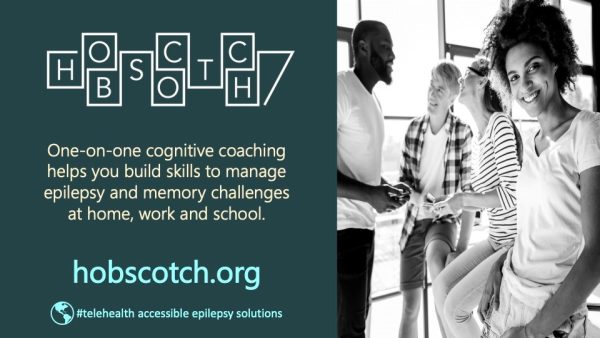
HOBSCOTCH was developed to help individuals with epilepsy adapt and work through various difficulties, including thinking or memory problems.
People with epilepsy commonly have problems with cognitive functions such as learning, concentration, and memory. These problems can occur for a variety of reasons, including the underlying cause of a person’s epilepsy, brain abnormalities, recurrent seizures, side effects of anti-seizure medicines, or any combination of these.
Not all people living with epilepsy have memory problems, but for those who do, these problems can diminish their quality of life. And people who have trouble with their memory often report feeling anxious about their symptoms, which can increase their stress and make their memory problems worse.
Epilepsy and Self-Management
Interested in Free One-on-One Epilepsy Self-Management Coaching?
To sign-up for the free program, simply email HI.EAA@hitchcock.org and say you’d like to enroll in HOBSCOTCH.
Researchers at Dartmouth College have developed an evidence based self- management program tailored to individuals living with epilepsy and cognitive challenges. HOBSCOTCH (which stands for Home-Based Self-Management and Cognitive Training Changes Lives) consists of eight, one-on-one, FREE telehealth counseling sessions with a certified Cognitive Coach, each lasting about 45 minutes to one hour. The sessions help individuals with epilepsy to adapt and work through various difficulties, including thinking or memory problems.
Learn more about Hobscotch
Program Development
For years, Dr. Barbara Jobst had seen patient after patient with memory problems in her clinic at the Dartmouth-Hitchcock Epilepsy Center at Dartmouth-Hitchcock Medical Center. “We could control their seizures, but they would continue to have problems with memory and concentration that were very limiting to their quality of life,” recalls Dr. Jobst, a leading epilepsy researcher and the chair of the Department of Neurology at Dartmouth’s Geisel School of Medicine.
Determined to help her patients, Dr. Jobst turned to colleagues at Dartmouth who had studied chemotherapy-related cognitive impairment in patients with cancer. A cognitive-behavioral therapy program to help cancer patients regain cognitive functioning was adapted to help patients with epilepsy. They called this new program HOBSCOTCH: Home-Based Self-Management and Cognitive Training Changes Lives.
Approach
HOBSCOTCH is a behavioral program that helps adults with epilepsy who have self-identified memory or thinking problems.
The program is divided into eight sessions lasting about 45 minutes to 1 hour. Participants are guided through each session by a certified “Cognitive Coach,” typically a licensed health care provider with experience in one-on-one counseling. They are assigned “homework” in the form of applying skills learned each week to their everyday life.
Patients who participate in HOBSCOTCH are given a “memory toolbox” with helpful strategies for setting up reminders. That could mean remembering names, keeping a schedule of appointments, using reminders to take medicine on time, or finding ways to limit distractions at work or in social settings.
Dr. Elaine Kiriakopoulos, an assistant professor of neurology at Dartmouth and director of the HOBSCOTCH Institute for Health and Well-being, states that another important component of the program is the instruction in mindfulness, because “the program teaches progressive muscle relaxation and deep breathing exercises that patients learn to use daily and as needed.”
HOBSCOTCH has four components:
- Education about epilepsy, memory and attention problems, and the factors that influence them.
- Training in self-awareness and relaxation.
- Training in the application of memory strategies.
- Problem-solving therapy.
Results
In 2016, Jobst and her colleagues conducted a randomized clinical trial of HOBSCOTCH. They found that the Dartmouth program greatly improved quality of life and cognition in adults with epilepsy. Study participants who did not receive HOBSCOTCH showed a decline in quality of life.
The Dartmouth team then studied HOBSCOTCH in a larger population, enrolling adults with epilepsy and cognitive problems at four centers in northern New England. That study found the same results—“a significant impact on both quality of life and memory perception,” says Kiriakopoulos. “It was exciting to see the benefits of the program replicated across different epilepsy centers.”
SIGN UP
To sign-up for the free program, simply email HI.EAA@hitchcock.org and say you’d like to enroll in HOBSCOTCH.
